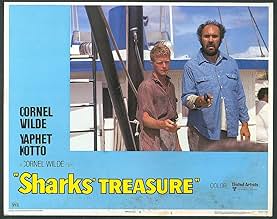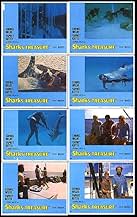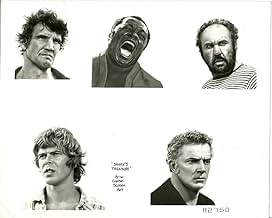Agrega una trama en tu idiomaAn aging fisherman finds a sunken treasure in shark-infested waters and is attacked by five escaping convicts.An aging fisherman finds a sunken treasure in shark-infested waters and is attacked by five escaping convicts.An aging fisherman finds a sunken treasure in shark-infested waters and is attacked by five escaping convicts.
- Dirección
- Guionista
- Elenco
John Nealson
- Ron
- (as John Neilson)
Roxanna Bonilla-Giannini
- Linda
- (as Roxanna Bonilla)
- Dirección
- Guionista
- Todo el elenco y el equipo
- Producción, taquilla y más en IMDbPro
Opiniones destacadas
Okay, a few things. First, the biggest problem with the movie seems to be its editing. Like a freshman essay, there are clearly parts that drag because they're nothing but obvious padding. Who knows how much footage Cornel Wilde -- who wrote, directed, and stars in this movie -- shot that ended up being badly assembled later. This is obvious because on a shot for shot level, the film is not incompetent. It's the patchwork assembly that makes it struggle.
Beneath that baroque mess is a fairly conventional plot. A ragtag group of treasure hunters goes looking for gold in open waters while a group of escaped convicts stand in essentially for pirates. There's the usual tough captain and tense grousing among the crew until the male bonding kicks in. This is also a movie where old fashioned masculinity is on display. Despite what a lot of seemingly young viewers might think about a gay subtext, it was pretty common among tough guys (or the ones playing them onscreen) to exhibit themselves, one part of out narcissism and one part out of intimidation. Sure, it's comical by today's standards, but it was taken more seriously in the 50s, 60s, and even parts of the 70s depending on generation.
That leads to the violence, too. We get to see not just the human stuff, tedious as it is, but more than a few sharks and other fish killed in sometimes brutal ways. It may happen in real life, but it just seems gratuitous here to demonstrate another silly masculine trope that killing something minding its own business somehow makes someone a man. The characterizations follow suit. Wilde's captain comes across as an overbearing nut, but if you know anything about his generation and pay attention to the script, it's mostly an act. For instance, his seemingly psychopathic need to control cigarettes aboard his ship is supposed to -- wink, wink -- show he really cares about his crew, as one of them, indeed, quits without initially realizing it.
In the end, the movie is a mess but not merely as much as some might think. It's competently if not imaginatively acted and directed, and while the recycled music makes for a patchwork score, there are a few moments where everything actually works. For the mid-1970s, that alone is remarkable given that Hollywood couldn't figure out if it wanted to make traditional movies or imitations of the low budget films the French, Italians, and Japanese had made in the 50s and 60s.
Beneath that baroque mess is a fairly conventional plot. A ragtag group of treasure hunters goes looking for gold in open waters while a group of escaped convicts stand in essentially for pirates. There's the usual tough captain and tense grousing among the crew until the male bonding kicks in. This is also a movie where old fashioned masculinity is on display. Despite what a lot of seemingly young viewers might think about a gay subtext, it was pretty common among tough guys (or the ones playing them onscreen) to exhibit themselves, one part of out narcissism and one part out of intimidation. Sure, it's comical by today's standards, but it was taken more seriously in the 50s, 60s, and even parts of the 70s depending on generation.
That leads to the violence, too. We get to see not just the human stuff, tedious as it is, but more than a few sharks and other fish killed in sometimes brutal ways. It may happen in real life, but it just seems gratuitous here to demonstrate another silly masculine trope that killing something minding its own business somehow makes someone a man. The characterizations follow suit. Wilde's captain comes across as an overbearing nut, but if you know anything about his generation and pay attention to the script, it's mostly an act. For instance, his seemingly psychopathic need to control cigarettes aboard his ship is supposed to -- wink, wink -- show he really cares about his crew, as one of them, indeed, quits without initially realizing it.
In the end, the movie is a mess but not merely as much as some might think. It's competently if not imaginatively acted and directed, and while the recycled music makes for a patchwork score, there are a few moments where everything actually works. For the mid-1970s, that alone is remarkable given that Hollywood couldn't figure out if it wanted to make traditional movies or imitations of the low budget films the French, Italians, and Japanese had made in the 50s and 60s.
There's some really impressive underwater action and ocean photography, but the rest of the movie is pretty tedious and unless you really want to watch old men in speedos yelling at each other or innocent sharks getting killed on camera, I can't recommend sitting through this forgotten slog.
Shipowner Cornell Wilde and some youngsters go in search of sunken Spanish treasure. Along the way they encounter sharks and pirates.
Cornell Wilde wrote, directed and starred in this loosely plotted modern adventure story, along with Yaphet Koto and a couple of youngsters. There's as much underwater photography -- a bit faded in the print I saw -- as story, and as much character exposition as gold.
Wilde had spent the 1950s as a dashing but minor action hero. Born in Hungary in 1912, he came to the US four years later. After a few uncredited bits in the 1930s, his break came in HIGH SIERRA, and he spent the next 20 years playing in a mix of costume dramas and more modern fare; he was one of the movies' better swordsmen, and was reputed to have turned down a slot in the American fencing team at the 1936 Olympics. His career slowed down in the 1960s, but some television guest shots and a few kept him reasonably active until shortly before his death in 1989.
Cornell Wilde wrote, directed and starred in this loosely plotted modern adventure story, along with Yaphet Koto and a couple of youngsters. There's as much underwater photography -- a bit faded in the print I saw -- as story, and as much character exposition as gold.
Wilde had spent the 1950s as a dashing but minor action hero. Born in Hungary in 1912, he came to the US four years later. After a few uncredited bits in the 1930s, his break came in HIGH SIERRA, and he spent the next 20 years playing in a mix of costume dramas and more modern fare; he was one of the movies' better swordsmen, and was reputed to have turned down a slot in the American fencing team at the 1936 Olympics. His career slowed down in the 1960s, but some television guest shots and a few kept him reasonably active until shortly before his death in 1989.
Since this movie will inevitably be associated with "Jaws" contrasts are inevitable, so here's one for you: In Spielberg's classic the shark is mechanical while the characters are real. In Cornel Wilde's film it's the opposite. Fortunately, as the title suggests, Wilde spends quality time with the sharks. Give it a C plus.
PS...You haven't lived until you've heard the Slovakian born star of this film channel his inner Randolph Scott.
PS...You haven't lived until you've heard the Slovakian born star of this film channel his inner Randolph Scott.
In his later years Cornel Wilde did a number of films on his own as his day as a box office draw had long gone. Stuff like Beach Red and The Naked Prey were interesting. Sharks' Treasure was quite a bit less in quality than those others were.
Wilde here is a charter boat captain no doubt giving three hour tours like the Skipper and Gilligan did on the USS Minow. Young surfer kid John Neilson brings an old Spanish gold doubloon and he knows where there might be more on the Mexican coast.
Wilde and Neilson take on Yaphett Kotto and David Canary as crew and the four set out for the spot that Neilson says the treasure was found. The four do some considerable diving and then have the misfortune to run across a group of escaped convicts led by Lobo as played by Cliff Osmond who certainly justified his name.
One of the convicts is David Gilliam who looks a lot like Neilson, blond and pretty and Osmond's personal boy toy from prison. Osmond's weakness is Gilliam and Neilson is no doubt grateful Gilliam's around otherwise these guys who haven't seen any female companionship would zero in on him. It all proves their undoing.
The underwater sequences are nice and the sharks as a dangerous as those in the various Jaws films. And the guys are all walking around in various states of undress which no doubt titillated the women and gay men in the audience. Cornel Wilde certainly looked in good shape for a guy in his sixties.
Sharks' Treasure is your routine action film, other than the underwater sequences and the well put together men, nothing more.
Wilde here is a charter boat captain no doubt giving three hour tours like the Skipper and Gilligan did on the USS Minow. Young surfer kid John Neilson brings an old Spanish gold doubloon and he knows where there might be more on the Mexican coast.
Wilde and Neilson take on Yaphett Kotto and David Canary as crew and the four set out for the spot that Neilson says the treasure was found. The four do some considerable diving and then have the misfortune to run across a group of escaped convicts led by Lobo as played by Cliff Osmond who certainly justified his name.
One of the convicts is David Gilliam who looks a lot like Neilson, blond and pretty and Osmond's personal boy toy from prison. Osmond's weakness is Gilliam and Neilson is no doubt grateful Gilliam's around otherwise these guys who haven't seen any female companionship would zero in on him. It all proves their undoing.
The underwater sequences are nice and the sharks as a dangerous as those in the various Jaws films. And the guys are all walking around in various states of undress which no doubt titillated the women and gay men in the audience. Cornel Wilde certainly looked in good shape for a guy in his sixties.
Sharks' Treasure is your routine action film, other than the underwater sequences and the well put together men, nothing more.
¿Sabías que…?
- TriviaThe opening theme song "Money, Money" was written by writer/director/star Cornel Wilde and sung by British musician Ken Barrie.
- Citas
Ron Walker: What happened to all that loot you found before?
Jim Carnahan: I blew it on my wardrobe.
- ConexionesFeatured in 42nd Street Forever, Volume 3: Exploitation Explosion (2008)
Selecciones populares
Inicia sesión para calificar y agrega a la lista de videos para obtener recomendaciones personalizadas
- How long is Sharks' Treasure?Con tecnología de Alexa
Detalles
Taquilla
- Total en EE. UU. y Canadá
- USD 2,000,000
Contribuir a esta página
Sugiere una edición o agrega el contenido que falta

Principales brechas de datos
By what name was Sharks' Treasure (1975) officially released in India in English?
Responda




























